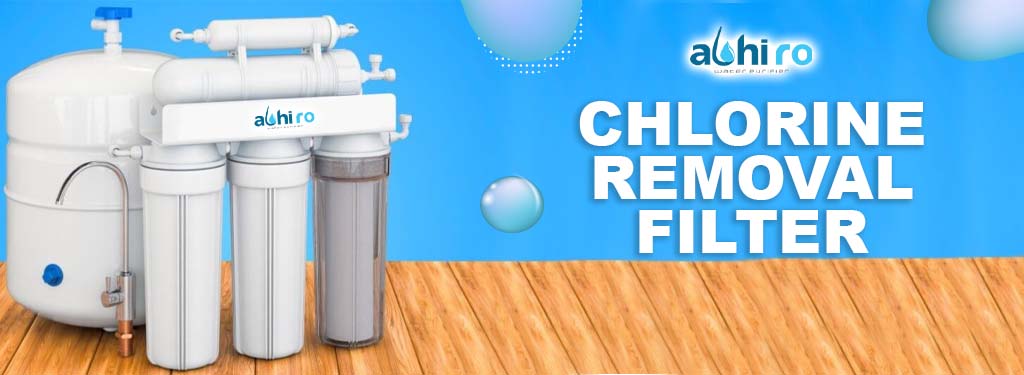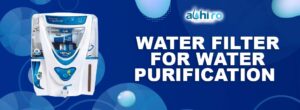
Are you also trying to find an affordable and reliable way to do so? Look no further than a chlorine removal filter – Abhiro. Chlorine helps keep the water in our homes safe, but it can also cause off-putting taste and odor issues that lead many people to seek alternatives.
Thankfully, Abhiro’s specialty filters offer an easy solution – a simple way to get rid of unwanted elements without sacrificing quality or performance. Their chlorine removal filter is designed with convenience and simplicity, so you can have crystal-clear water no matter where you drink from!
Process Of Chlorine Removal Filter – Abhiro
Abhiro’s filter is a revolutionary product that quickly and effectively removes chlorine from water, leaving it safe and clean to drink.
- The process begins by drawing in tap water through the machine’s top-tier activated carbon filter.
- This filter traps bigger chlorine particles right before they enter the tank.
- Inside the reservoir, another filter powered by great-tasting technology absorbs tiny microbial impurities, simultaneously producing a smooth water flow.
- The system is then complete as the disinfected liquid exits through Abhiro’s advanced outlet, where bacterial growth is also inhibited.
Thanks to three layers of engineering excellence, Abhiro’s filters are guaranteed to give you refreshing water free from any harmful matter—in mere seconds!
Why Chlorine Is Added To Drinking Water?
Chlorine is an important disinfectant added to drinking water for a variety of reasons. When chlorine is added to water, it acts as an effective bactericide and prevents the spread of harmful diseases.
Without chlorine, our drinking water can become contaminated by dangerous microorganisms or parasites that may cause severe illnesses. Furthermore, chlorine serves as an oxidizing agent which helps to reduce the odor, taste, and discoloration of our water supply; thus making it more appealing for consumption.
Finally, since chlorine is relatively inexpensive compared to other chemical disinfectants, municipalities around the world are able to provide their citizens with clean, healthy drinking water at an affordable price. All in all, chlorine plays a critical yet often overlooked role in providing us with a safe and reliable source of drinking water.
How Does Chlorine Affect Water Quality?
Chlorine is a disinfectant commonly used in water treatment to remove bacteria, viruses, and other potential health hazards. Despite its ability to prevent waterborne illnesses, chlorine also has the potential to harm drinking water and those who consume it.
Studies have linked the long-term consumption of chlorinated water with increased risks of bladder and rectal cancer, asthma attack frequency, miscarriages, and lower IQ scores in children.
Additionally, pH levels can be affected by elevated concentrations of chlorine as well as aesthetic consequences like bad taste, nauseating odors, and discoloration. Homes that rely on chlorinated tap water should consider installing filtration devices in order to reduce the harmful effects on their potable water supply.
It’s important to recognize the positive benefits of chlorine, but just as important to take necessary precautions when it comes to protecting oneself from its potentially hazardous side effects.
What Are The Side Effects Of Too Much Chlorine In Drinking Water?
Too much chlorine in drinking water is a serious health risk. Not only can it cause an array of symptoms such as nausea and vomiting, but some studies have also suggested that over-chlorinated water is connected to increased rates of bladder cancer.
In addition, ingesting too much chlorine disrupts the natural balance of healthy bacteria in our bodies, which can compromise our overall immunity. Chlorine’s harshness also has an adverse effect on our skin and hair, leaving them brittle and dry.
Depending on the particular product used for chlorination, it can impart a distinct smell and taste to the water – not one appealing! Needless to say, it’s important to stay informed about how much chlorine is in your drinking water so that you can anticipate any potential side effects caused by its overuse.
FAQs: Chlorine Removal Filter
Q 1: Is Chlorine Filtration Possible?
A 1: To effectively remove chlorine from tap water, use filters. These gadgets can be mounted underneath the sink, attached to a faucet, or both. Other filters can be installed permanently, filtering the water entering your home as a whole.
Q 2: How Can Chlorine Be Effectively Removed From Water?
A 2: Yes, all of the chlorine in tap water may be removed by boiling it for 15 minutes. Alternatively, the chlorine will evaporate without boiling if you leave a jug of water out at room temperature for at least 24 hours.
Q 3: Can Chlorine Be Removed By A UV Filter?
A 3: UV therapy is a dechlorination method that is becoming more and more well-liked because it has none of the aforementioned problems. Both free chlorine and mixed chlorine compounds (chloramines) are reduced by high-intensity, broad-spectrum UV systems, often referred to as medium-pressure UV systems, into readily removed byproducts.
Wrapping Up
The Abhiro is an amazing chlorine removal filter that can provide you with clean and pure water. It is important to have a good quality water filtration system in order to have safe drinking water.
This product is definitely worth the investment and I would highly recommend it to anyone looking for a good quality water filtration system. Thanks for reading.
Also Read: Katalox Light Water Filter



